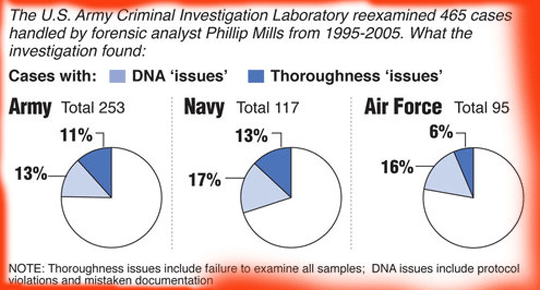
Marisa Taylor For McClatchy has done an excellent three-part series on the military’s use of the death penalty.
Here are clips from all three parts:
RACE AND THE DEATH PENALTY IN THE MILITARY
Interestingly, it seems that the racial disparities are the starkest when those killed are outside the military. Military on Military murders seem to be less affected to the st
Ten of the 16 men whom the military has sentenced to death in the last 27 years share another common characteristic: They’re all minorities.
The racial imbalance in the military’s death penalty isn’t new. As far back as the early 1970s, the military has acknowledged racial bias in its judicial system. The civilian court systems have similar disparities.
But one recent statistical analysis has found that the problem endures and is in some ways worse than on the civilian side.
A study by a group of law and statistics professors found that minorities in the military were twice as likely to be sentenced to death as their white counterparts, a statistic higher than is known to exist in most civilian court systems.
DEATH SENTENCES HANDLED SO POORLY THEY ARE FREQUENTLY OVERTURNED
It is rarely question of innocence at all when these military capital cases are overturned. It is a matter instead of hopeless bungling by the defense at trial, of evidence grossly mishandled by prosecutors, and more.
In December 2008, former Army Pvt. Ronald Gray was on the brink of becoming the first military execution in almost 50 years.
The rapist and murderer of four women had sat on death row for two decades by the time President George W. Bush approved his death warrant.
But the week before Gray was to receive a lethal injection, a federal judge halted the execution because of a new appeal.
Now, federal defenders who took over his case say they’ve found new evidence that his original military lawyers should have discovered. If they’re successful, Gray could join a growing number of soldiers, airman and marines who have been spared execution.
Of the 16 men sentenced to death since the military overhauled its system in 1984, 10 have been taken off death row. The military’s appeals courts have overturned most of the sentences, not because of a change in heart about the death penalty or questions about the men’s guilt, but because of mistakes made at every level of the military’s judicial system.
The problems included defense attorneys who bungled representation, judges who didn’t know how to properly instruct a jury and prosecutors who mishandled evidence.
In all of the cases, the men have been resentenced to life in prison. Eventually, they could be eligible for parole.
Yet by many measures, they’re the military’s worst of the worst. Convicted of crimes such as serial murder and rape, they’re the kinds of criminals that many people would agree the death penalty should be reserved for.
Then why have they been spared?
Critics say the military botched the cases because its judicial system lags behind civilian courts and isn’t equipped to handle the complex legal and moral questions that capital cases raise.
THE DETAILS OF A BAD DEFENSE
Nobody is suggesting Army Maj. Nidal Malik Hasan didn’t commit the horrific murders of which he was accused. “It’s not a whodunit, but a whydunit,” said Dwight Sullivan, senior appellate defense counsel for the Air Force.
When military jurors sentenced former Marine Lance Cpl. Ronnie Curtis to death, they had every reason to believe that he deserved to be executed. No one disputed that he’d stabbed and killed his superior officer and the officer’s wife inside their home. The only real question was why.
But what the jury learned at trial made the crime seem even more inexplicable. After all, he had a good Christian upbringing by caring parents. No one could have predicted the murders based on his background.
On appeal, his lawyers discovered a very different story. They found that Curtis’ adoptive father was frequently drunk, including during the lawyers’ visit to their client’s childhood home in Kansas. When questioned about his son, Curtis’ father showed off the horsewhip he’d used to beat him after adopting him at age 2.
In capital cases, such details could be enough to save a defendant from death row. Yet the realities of Curtis’ troubled childhood, along with evidence that he was drunk when he committed the murders, were never presented at his sentencing at Marine Corps Base
AND THERE’S THE LITTLE MATTER OF THE MILITARY CRIME LAB
<hr?.
AND IN OTHER NEWS: TWO SIDES CLASH OVER RELEASE OF PROP 8 TRIAL VIDEO
Adversaries in the legal battle over same-sex marriage in California clashed Monday over the release of courtroom videos, with gay-rights groups arguing for the public’s right to watch last year’s trial and their opponents saying the judge promised to keep the footage sealed.
The videos, whose live broadcast was blocked by the U.S. Supreme Court, are still “the ultimate judicial record (that) will allow the public to see exactly what led Judge (Vaughn) Walker to strike down Proposition 8,” Theodore Boutrous, lawyer for two gay and lesbian couples and an advocacy group, said at a federal court hearing in San Francisco.
NOTE: LIGHT BLOGGING TODAY (WEDDING PREP AND ALL THAT)
